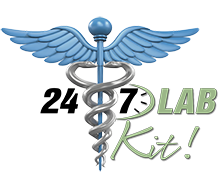When to Get Tested for STDs: A Guide for Different Sexual Behaviors

Maintaining good sexual health is a vital part of overall well-being. Regular STD testing is an essential and critical aspect of responsible sexual behavior, as it helps detect and prevent the spread of sexually transmitted infections. And as Vybe explains, the spread of STDs is often a result of the lack of symptoms in many STDs. Luckily, 247Labki believes in empowering individuals to take control of their sexual health through convenient and reliable at-home STD testing.
In this blog post, we will explore different sexual behaviors and discuss when it’s important to get tested for STDs.
When to Get Tested According to Sexual Behavior
Because some people are at higher risk for STDs, not everyone needs to be tested as little/frequently as others. Below, you’ll discover helpful STD testing tips for people of all lifestyles and preferences.
Monogamous Relationships
If you are in a monogamous relationship where both partners have been tested and are committed to remaining exclusive, it is generally recommended to get tested for STDs before engaging in sexual activity with a new partner. This precaution ensures that you both start on a clean slate and helps maintain trust and transparency within the relationship.
Regular testing every six months or as recommended by your healthcare provider is advisable to ensure ongoing sexual health.
Casual or Non-Monogamous Relationships
For individuals engaging in casual or non-monogamous sexual relationships, the frequency of STD testing should be higher. It is crucial to get tested before starting a new sexual relationship and to practice safe sex consistently with barrier methods, such as condoms, to reduce the risk of transmission.
Regular testing every three to six months, or more frequently if you have multiple partners, is recommended to monitor your sexual health and prevent the spread of infections.

Unprotected or High-Risk Sexual Encounters
Engaging in unprotected sex or participating in high-risk sexual activities, such as sex work, sharing needles, or engaging in group sex, increases the risk of contracting STDs. In such cases, it is crucial to get tested regularly, even if you do not exhibit any symptoms.
Testing should occur at shorter intervals, such as every three months or as recommended by your healthcare provider, to ensure early detection and prompt treatment, if necessary.
Newly Single or Prior to Engaging in Sexual Activity
If you are newly single or have been sexually inactive for an extended period, it is wise to get tested before embarking on a new sexual relationship. This precautionary step helps ensure that you start with a clean bill of sexual health and allows for open and honest communication with your new partner.
Symptoms or Concerns
If you experience any unusual symptoms, such as pain, discharge, sores, or itching in the genital area, it is essential to seek medical attention and get tested promptly. Do not delay testing if you suspect you may have been exposed to an STD or if you have concerns about your sexual health. Early detection and treatment are key to managing and preventing the spread of infections.
Trust 247Labkit for Your STD Testing Needs

Taking charge of your sexual health includes regular STD testing. The appropriate timing for testing depends on your sexual behaviors and individual circumstances. Whether you are in a monogamous relationship, exploring casual encounters, engaging in high-risk activities, or experiencing symptoms, regular STD testing is crucial, according to Mayo Clinic.
At 247Labkit, we offer discreet and convenient at-home STD testing kits that provide accurate results and peace of mind. Prioritize your sexual health by getting tested regularly and encouraging open conversations about STDs with your partners and healthcare providers. Remember, knowledge is power when it comes to your sexual well-being.







Comments are closed